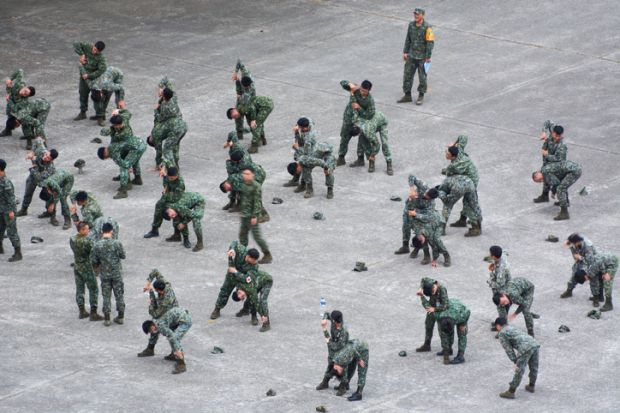As Taiwan’s policymakers mull an expansion of its military training system, some scholars and students are saying that universities could play a larger role in shoring up its defences.
Russia’s invasion of Ukraine a month ago rekindled discussions about Taiwan’s preparedness for potential invasion, as the Kremlin’s move stoked concerns that China might be emboldened to act similarly in Taiwan, an island that has long had its own government but which Beijing considers to be part of China.
“Universities have great potential if they can cooperate with the military system and offer relevant professional courses,” said Chang Cheng-Yu, president of the National Taiwan University Student Association, who noted that most Taiwanese universities were “very alienated from the military system”, which he said is largely considered “outdated”.
“Using our expertise to develop curricula for the military to train recruits more effectively, universities can play a greater role in the reorganisation of military training in Taiwan and educate students on the importance of issues of national awareness and national identity,” said Huang Yen-wei, dean of the National Taiwan University Graduate Student Association.
He added that education would mean “not just fighting with guns” but a broader consideration of defence, including “strategic thinking and values”.
Sarah Liu, a lecturer in politics and international relations at the University of Edinburgh, suggested that institutions could adopt something similar to the US-based Reserve Officer Training Corps (ROTC) programme, wherein students take courses and train throughout their four years of undergraduate education.
She noted that many ROTC students in the US attended university for free in return for their service in the military and for “sharing their expertise once they graduate”.
Currently, Taiwanese law requires men over 18 years to enrol in military training for four months. Starting in 2004, Taiwan’s then two-year mandatory conscription was progressively shortened in length to one year and then further cut back to the current four-month period.
Taiwan’s universities historically have required students to take a few credits of military training, said John Chung-En Liu, an associate professor of sociology at National Taiwan University.
“Most of these courses are taught in the classrooms, instead of really physical things, and considered easy credits,” he said, adding that such courses were usually electives and have long been considered “residues from our authoritarian era”.
While most academics speaking with Times Higher Education were sceptical that compulsory military service would again grow to two years, a lengthened conscription period could potentially mean a shake-up for universities, said Michael Hunzeker, associate director of the Center for Security Policy Studies at George Mason University.
“Although conscription isn’t anything new per se…a major shift in conscription policy will no doubt have an impact on Taiwanese higher education,” he said.
Huang Yen-wei agreed that “because of potential changes in conscription, universities may need to make some major changes and recalibrate admissions”.
“If conscription is extended, universities need to think more about their enrolment figures to compensate for young people who are deferring degrees. If the conscription is brought forward to be ahead of university, this can make it trickier for admissions agencies, which means a redesign of the system,” he said.
But Taiwanese institutions need not be limited by training soldiers to run in formation or shoot at targets, said Dr Liu. As the conflict in Ukraine has shown, war also creates a need for people who can counter hacking attempts or run diplomacy efforts.
“Another way for the universities to get more involved would be to offer more courses that offer transferable skills to the military, such as computer science courses, data analysis courses, international relations, war and peacebuilding,” she said, adding that such training could be targeted at women as well as men.
“The key here is to ensure that [Taiwanese universities are] providing transferable skills to the military.”




